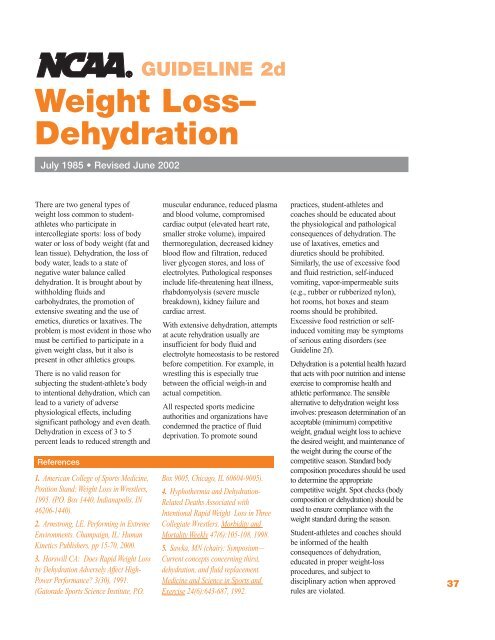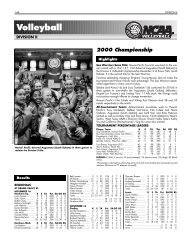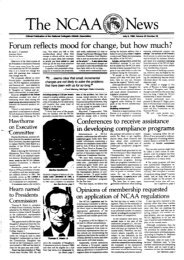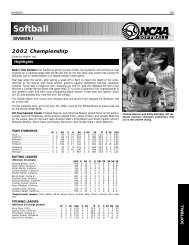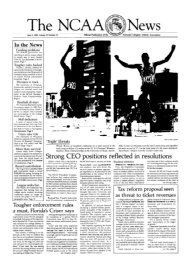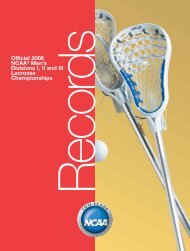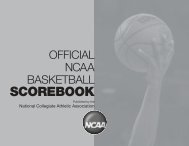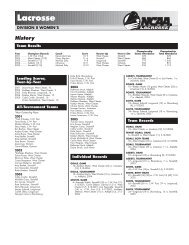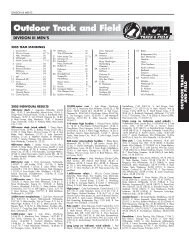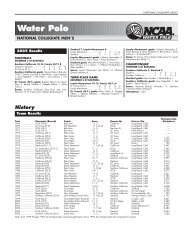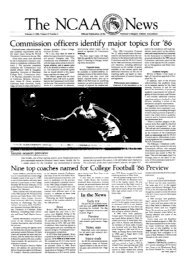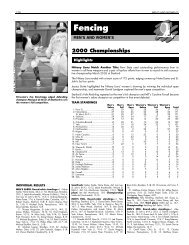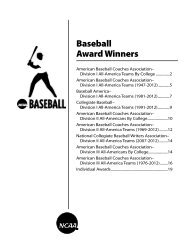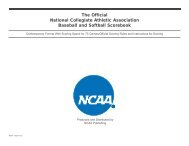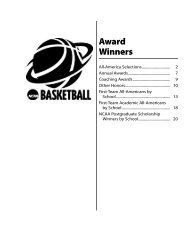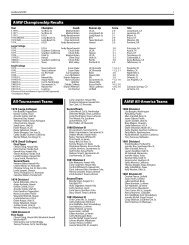Sports Medicine Handbook - NCAA
Sports Medicine Handbook - NCAA
Sports Medicine Handbook - NCAA
You also want an ePaper? Increase the reach of your titles
YUMPU automatically turns print PDFs into web optimized ePapers that Google loves.
Weight Loss –<br />
Dehydration<br />
July 1985 • Revised June 2002<br />
There are two general types of<br />
weight loss common to studentathletes<br />
who participate in<br />
intercollegiate sports: loss of body<br />
water or loss of body weight (fat and<br />
lean tissue). Dehydration, the loss of<br />
body water, leads to a state of<br />
negative water balance called<br />
dehydration. It is brought about by<br />
withholding fluids and<br />
carbohydrates, the promotion of<br />
extensive sweating and the use of<br />
emetics, diuretics or laxatives. The<br />
problem is most evident in those who<br />
must be certified to participate in a<br />
given weight class, but it also is<br />
present in other athletics groups.<br />
There is no valid reason for<br />
subjecting the student-athlete’s body<br />
to intentional dehydration, which can<br />
lead to a variety of adverse<br />
physiological effects, including<br />
significant pathology and even death.<br />
Dehydration in excess of 3 to 5<br />
percent leads to reduced strength and<br />
References<br />
1. American College of <strong>Sports</strong> <strong>Medicine</strong>,<br />
Position Stand: Weight Loss in Wrestlers,<br />
1995. (P.O. Box 1440, Indianapolis, IN<br />
46206-1440).<br />
2. Armstrong, LE. Performing in Extreme<br />
Environments. Champaign, IL: Human<br />
Kinetics Publishers, pp 15-70, 2000.<br />
3. Horswill CA: Does Rapid Weight Loss<br />
by Dehydration Adversely Affect High-<br />
Power Performance? 3(30), 1991.<br />
(Gatorade <strong>Sports</strong> Science Institute, P.O.<br />
GUIDELINE 2d<br />
muscular endurance, reduced plasma<br />
and blood volume, compromised<br />
cardiac output (elevated heart rate,<br />
smaller stroke volume), impaired<br />
thermoregulation, decreased kidney<br />
blood flow and filtration, reduced<br />
liver glycogen stores, and loss of<br />
electrolytes. Pathological responses<br />
include life-threatening heat illness,<br />
rhabdomyolysis (severe muscle<br />
breakdown), kidney failure and<br />
cardiac arrest.<br />
With extensive dehydration, at tempts<br />
at acute rehydration usually are<br />
insufficient for body fluid and<br />
electrolyte homeostasis to be restored<br />
before competition. For example, in<br />
wrestling this is especially true<br />
between the official weigh-in and<br />
actual competition.<br />
All respected sports medicine<br />
authorities and organizations have<br />
condemned the practice of fluid<br />
deprivation. To promote sound<br />
Box 9005, Chicago, IL 60604-9005).<br />
4. Hyphothermia and Dehydration-<br />
Related Deaths Associated with<br />
Intentional Rapid Weight Loss in Three<br />
Collegiate Wrestlers. Morbidity and<br />
Mortality Weekly 47(6):105-108, 1998.<br />
5. Sawka, MN (chair): Symposium—<br />
Current concepts concerning thirst,<br />
dehydration, and fluid replacement.<br />
<strong>Medicine</strong> and Science in <strong>Sports</strong> and<br />
Exercise 24(6):643-687, 1992.<br />
practices, student-athletes and<br />
coaches should be educated about<br />
the physiological and pathological<br />
consequences of dehydration. The<br />
use of laxatives, emetics and<br />
diuretics should be prohibited.<br />
Similarly, the use of excessive food<br />
and fluid restriction, self-induced<br />
vomiting, vapor-impermeable suits<br />
(e.g., rubber or rubberized nylon),<br />
hot rooms, hot boxes and steam<br />
rooms should be prohibited.<br />
Excessive food restriction or selfinduced<br />
vomiting may be symptoms<br />
of serious eating disorders (see<br />
Guideline 2f).<br />
Dehydration is a potential health hazard<br />
that acts with poor nutrition and intense<br />
exercise to compromise health and<br />
athletic performance. The sensible<br />
alternative to dehydration weight loss<br />
involves: preseason determination of an<br />
acceptable (minimum) competitive<br />
weight, gradual weight loss to achieve<br />
the desired weight, and maintenance of<br />
the weight during the course of the<br />
competitive season. Standard body<br />
composition procedures should be used<br />
to determine the appropriate<br />
competitive weight. Spot checks (body<br />
composition or dehydration) should be<br />
used to ensure compliance with the<br />
weight standard during the season.<br />
Student-athletes and coaches should<br />
be informed of the health<br />
consequences of dehydration,<br />
educated in proper weight-loss<br />
procedures, and subject to<br />
disciplinary action when approved<br />
rules are violated.<br />
37


